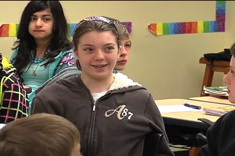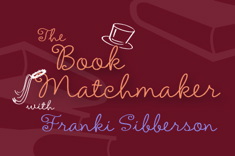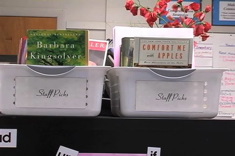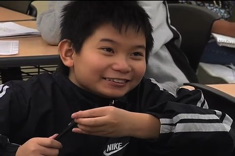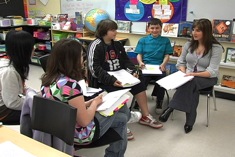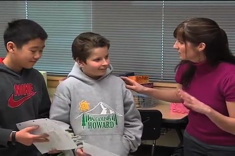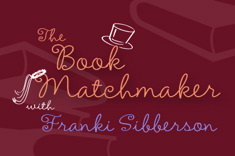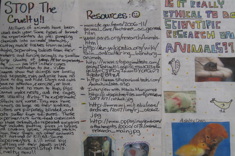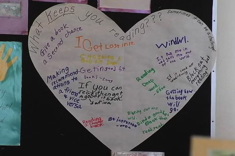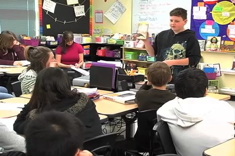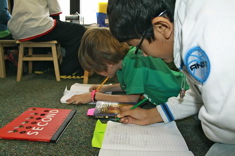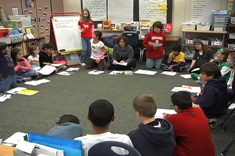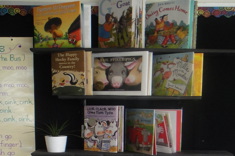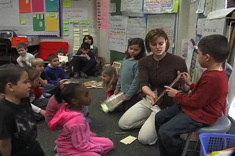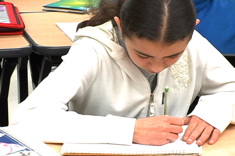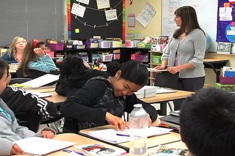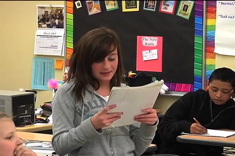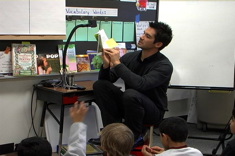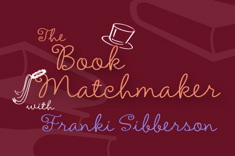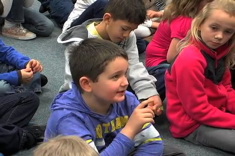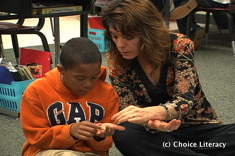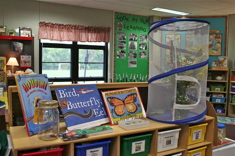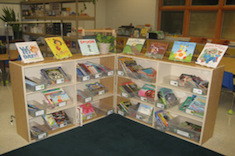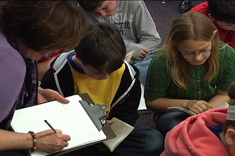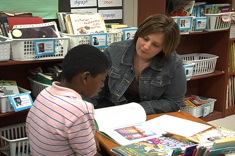Teaching Reading
Our contributors lead reading workshops in classrooms with creative flair. Over the past 12 years, we've filled our site with loads of suggestions, tools, and tips for using engaging books throughout the curriculum to hook kids on reading. Here is where you will find many stories of successful and not-so-successful workshop days, and what we learned from them. We bring these stories to life through hundreds of video examples.
Latest Content
“The Wrath of Guess Jeans”: Response and Read Around
In this second video in a three-part series, Katie Doherty leads her 6th graders through a response activity. In this installment, the students respond orally and share some of their writing, making links to pop culture and other books from reading workshop.
Book Matchmaker: A Friendship Theme for Literature Circles
Franki Sibberson shares her top picks for literacy circles with a friendship theme. This is an excellent theme for building community any time of year.
Building the Reading Community Among Teachers
Jennifer Allen shares a few strategies for building the reading community beyond individual classrooms in your school. Book swaps, a shared staff novel, and family literacy breakfasts all reinforce the most important aspect of reading – it should be pleasurable and engrossing, no matter the age of the learner.
“The Wrath of Guess Jeans”: Debrief
In this third video in a three-part series, Katie Doherty leads her 6th graders through a response activity. The text they are reading was written by a middle school student over a decade ago, and its themes of popularity and belonging still ring true for students. In this installment, Katie debriefs with students about the value of the writing activity.
Quick Take: Katie Doherty on Middle School Reading Workshop Choices
In this two-minute Quick Take video, Katie Doherty explains the choices students have in her sixth-grade reading workshop.
A District Film Festival: Giving Kids An Authentic Audience for Their Work
Lights, cameras, and even a red carpet! Bill Bass documents how a film festival brought high school teachers and students together, with a strong focus on connecting district goals and standards to the fun projects.
Preparing for Book Talks
In this first video in a two-part series, Katie Doherty meets with her sixth-grade students who will be sharing their book recommendations with the class.
Book Matchmaker: Texts to Build Stamina
In this installment of Book Matchmaker, Franki Sibberson has suggestions for books to build reading stamina in students.
Persuasive Pamphlets
Erin Ocon and her middle-school students observe some political activists passing out pamphlets outside the building for a few moments. Voila – the pamphlet project is born. Pamphlets are the perfect genre for teaching persuasion and summary, two key skills highlighted in the Common Core.
Connecting Students, Wall Charts, and Reading
In this conference with third-grade student Jeffrey, Beth Lawson helps this young reader think through the importance of developing stamina to get through the first 50 pages of a book.
Student Book Talks
In this second video in a two-part series, Katie Doherty's sixth-grade students share their book recommendations with the class. Students work from a template provided by Katie to ensure their presentations are brief, thoughtful, and connected to reading workshop.
Family History Inquiry Project: Integrating Technology with Social Studies in First Grade
Julie Johnson explains how a family history inquiry project in her first-grade classroom built technology, literacy, and research skills as students explored many cultures.
Procedural Writing in Math
Heather Rader explains how mentor texts for math instruction need some specific attributes.
Read Alouds for the Last Days of School
Choice Literacy readers share some of their favorite read alouds for the last days of school.
Book Matchmaker: Teaching Inferring to Intermediate Students
In this installment of Book Matchmaker, Franki Sibberson discusses the challenges of finding a range of books to teach the concept of inferring to grades 3-5 students.
Save the Picture Books!
Are picture books endangered species? Sales are plummeting, in part because parents and teachers are pushing students into chapter books at ever-younger ages. Shari Frost turns a critical eye on her own practice, and brainstorms practical ways to promote the value of picture books in classrooms.
Purposeful First Grade Reading Share Sessions
Katie DiCesare prompts her 1st grade students during the reading share time at the end of workshop to make connections between the strategies they use during independent reading time and the day’s minilessons.
Writing and Publishing Book Reviews with Middle School Students
What teenager doesn't enjoy critiquing everything in the world? Erin Ocon puts that judgmental passion to good use in her classroom with a book review assignment.
Seedfolks: Connecting Community and Literature
There's so much to do during the first weeks of school, but it's important not to skip the most important thing – building a sense of community with your students.
Clearing Up Confusion
Katie Doherty works closely with a student who has an unusual request – he wants to take home a basal anthology for "pleasure reading." She puts a different text in his hands, and uses what she learns from the experience to design a for lesson her 6th grade students.
Books to Celebrate Earth Day
Earth Day in April is a great time to get outdoors with a good book! Franki Sibberson shares some of her favorite texts linked to Earth Day.
Read Alouds for the First Day of School
Choice Literacy readers share their favorite read alouds for the start of the year.
Book Matchmaker: Characters Across the Grades
In this installment of Book Matchmaker, Franki Sibberson provides a range of books for teaching character development in fiction for grades 3-5 students.
Teaching Students Retelling Strategies
Retelling is an essential skill for readers, and it’s one that is crucial for success on most state exams too. In Part 1 of a two-part series, Clare Landrigan and Tammy Mulligan share strategies and sample lessons.
The Power of Wonder Questions
Andrea Smith writes about how she uses wonder questions in her science curiculum.
Ready-to-Go Readers’ Theater Books
If you want to do more with readers’ theater to promote fluency, but can’t afford one of those expensive kits, you’ll enjoy this booklist. Shari Frost has compiled her favorite readers’ theater books with texts and illustrations students love.
What Messages Do We Give Students with Our Classroom Library Design?
Franki Sibberson describes how the topics and arrangements of baskets in the classroom library give strong messages about reading to students.
I Need a Hero: Finding a Place for Comics and Graphic Novels in Our Classrooms
Terry Thompson provides five easy steps for incorporating the use of more graphica and comics in your teaching:
Assessment Beyond Levels: The Reading Grid
Is there a great divide in your classroom between numerical data from assessments and your anecdotal notes? Cathy Mere bridges the gap with her class reading grid, a nifty tool for recording and analyzing a whole classroom’s worth of student assessment data on one page. A template is included.
Using Student Conferences to Build Book Choice Skills
Franki Sibberson provides focus questions and a template to help choose books with students for independent reading.
Browse Content By
Type
Category
- Assessment Tools
- Big Fresh Archives
- Booklists
- Choice Numeracy
- Classroom Design
- Common Core
- Community Building
- Conferring
- Content Literacy
- Digital Literacy
- English Language Learners
- Equity
- Family Relations
- Free Samples
- Guiding Groups
- Leadership
- Literacy Coaches
- Mentor Texts
- Minilessons
- New Teacher Mentors
- Podcasts
- Poetry
- Quote Collections
- Reading Strategies
- Self Care
- Struggling and Striving Learners
- Talking and Listening
- Teacher Study Groups
- Teaching Reading
- Teaching Writing
- Word Study and Vocabulary
Author
- Melissa Quimby
- Nawal Qarooni
- Gwen Blumberg
- Julie Cox
- The Lead Learners
- Hannah Tills
- Josie Stewart
- Ruth Metcalfe
- Mallory Messenger
- Becca Burk
- Jodie Bailey
- Vivian Chen
- Mary Brower
- Tiffany Abbott Fuller
- Stephanie Affinito
- Ruth Ayres
- Leigh Anne Eck
- Heather Fisher
- Shari Frost
- Julie Johnson
- Suzy Kaback
- Gigi McAllister
- Shirl McPhillips
- Melanie Meehan
- Cathy Mere
- Debbie Miller
- Tara Barnett and Kate Mills
- Tammy Mulligan
- Dana Murphy
- Bitsy Parks
- David Pittman
- Brenda Power
- Heather Rader
- Matt Renwick
- Mandy Robek
- Christy Rush-Levine
- Gretchen Schroeder
- Jen Schwanke
- Brian Sepe
- Katherine Sokolowski
- Stella Villalba
- Jennifer Vincent
Grade Level
Choice Literacy Membership
Articles
Get full access to all Choice Literacy article content
Videos
Get full access to all Choice Literacy video content
Courses
Access Choice Literacy course curriculum and training

